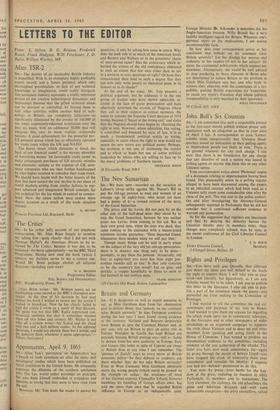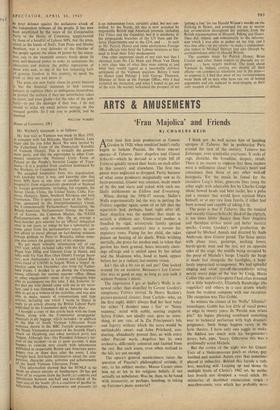Rights and Privileges
SIR,—You have said, qua ()noodle. that although you detest my ideas you will defend to the death my right to express them. I will take you at your word—not literally, but figuratively, as I am sure Voltaire meant his to be taken. I ask you to publish this letter in the Spectator. I also ask you to pub- lish a part of the statement which—by proxy—you prevented me from making to the Committee of Privileges.
I had wanted to tell the committee the real cir- cumstances and purposes of my visit to Hanoi. I had wanted to give them my reasons for regarding the attack made upon me in commercial television, in the Spectator and in other newspapers of wider circulation as an organised campaign to suppress the truth about Vietnam and to deter me and other members from speaking and acting freely in the House of Commons. l had wanted to produce my documentary evidence to the committee, including evidence of. the real authorship of the attacks. This latter you have now made unnecessary, for—again by proxy through the mouth of Selwyn Lloyd—you have stripped the cloak of anonymity from your contributor and revealed his identity. I suppose you had his—belated—permission to do this.
You won—by proxy—your battle for the free- dom of the press, including its freedom to vilify Parliament. its members and its institutions. The Tory clansmen. the clubmen, the old schoolboys, the press and television directors and—with some honourable exceptions—the privy councillors, rallied
to your defence against the audacious attack of the independent tribunes of the people. It has now been established by the votes of the Conservative Party in the House of Commons, supplemented by those of a handful of Labour MPs, that the press, which in the hands of Swift, Tom Paine and Jeremy Bentham, was a true defender of the liberties of the people against the abuse of power by the execu- tive, can in the twentieth century freely abuse its 'own well-financed power in order to assassinate the characters and destroy the public reputations of those who seek, in one of the few remaining halls of genuine freedom in this country, to speak the truth as they see and know it.
The press can now freely abuse its power because it has the financial resources to hire cunning lawyers to rephrase libels as ambiguous innuendoes, to protect the authors if they are nevertheless taken to court, and even gladly—for the sake of the pub- licity—to pay the damages if they lose. I do not intend to stake my small private savings, on this unequal gamble. So I ask you to publish, and be damned.
House of Commons, SW!
WILLIAM WARBEY
Mr. Warbey's statement is as follows:
My first visit to Vietnam was made in May 1957, iII company with Ian Mikardo, Harold Davies, Lena Jeger and the late John Baird. We were invited by the Fatherland Front of the Democratic Republic of Vietnam (Hanoi). This is virtually the govern- ment party, and like the equivalents in other Com- niunist countries—the National Unity Front of Poland or the People's Socialist League of Yugo- slavia—it is a popular front coalition dominated by the Workers, or Communist Party.
We accepted hospitality from this organisation, well knowing what it was, and knowing also that most MPs have at one time or another accepted hospitality from organisations sponsored or financed by foreign governments, including, for example, the Soviet Union, China, the United States, Cuba, For- mosa. Hungary, Spain, Southern Rhodesia and both Clermanies. This is quite apart from all the `official' trips, sponsored by the Interparliamentary Union, the Commonwealth Parliamentary Association. the British-American Parliamentary Group, the Coun- cil of Europe, the Common Market, the NATO Parliamentarians, and the like. On an average a back-bencher gets selected for an `official' delegation once in ten years, so unless he has a substantial in- come apart from his parliamentary salary, he can- not afford to travel abroad on fact-finding,missions
• (except perhaps to Paris or Brussels), unless some- one else covers the greater part of his expenses.
We got much valuable information out of our 1957 visit, which included talks with Ho Chi Minh, Pham Van 138ng and General Giap in Hanoi, and talks with Vu Van Mau (then Diem's Foreign Secre- tary, now Ambasiador in London) and Leland Bur- rows (head of USOM) in Saigon. When a 'repeat' in- vitation came last December, also from the Father- land Front, I decided to go during the Christmas recess, although for various reasons—office, illness or other engagements—none of my colleagues were able to accompany me this time. I did, however, in- sist that my wife should come with me as my secre- tary, and it was fortunate I did so, because she was able to act as a witness of my activities, and was also able to make reports of conversations and type articles, including one which I wrote in Hanoi in reply to an article abusing the British Labour Party Published in the Communist daily Nahn Dan.
I brought a copy of this article back with me from Hanoi, along with the 'Communist propaganda' materials in my luggage, which included—in addition to the film of South Vietnam Liberatioa Front activities shown in the BBC Tonight programme— the North Vietnamese account of the Seventh Fleet's
attack on Haiphong and other northern ports last August. Although this—like President Johnson's ver-
sion of the incident—is an es parse account, it does
naPPen to coincide very closely with information Published in respectable British and American news-
papers two or three days after the event. I also brought back first-hand information about the com- position, character aims, activities and achievements 01 the South Vietnam Liberation Front.
This information showed that the SVNLF is (a) made up almost entirely of Southerners; (b) has got most of its weapons from the South; (c) controls and administers between one-half and two-thirds of the land area of the South; (d) is a coalition of pacifist in- tellectuals, Buddhists. Communists and peasants; (e)
is an independent force, certainly aided, but not con- trolled, by the North. All this is now accepted by responsible British and American journals, including The Tithes and the Guardian, but it is anathema to the propaganda branches of the .US State and De- fence Departments and to the CIA,-and ... to such as Mr. Patrick Honey and some anonymous Foreign Office officials who brief the Labour ministers as they -used to brief their Tory predecessors.
One other important result of my visit was that I obtained from Ho Chi Minh and Pham Van Dong a very clear idea of what they were aiming at and what they would regard as a reasonable political settlement of the Vietnam question. Before I went to Hanoi (and Peking) I told George Thomson, Minister of State at the Foreign Office, why I had accepted the invitation, and what I hoped to get out of the visit. lie warmly welcomed the prospect of my
'getting a line' (to use Harold Wilson's words) on the thinking in Hanoi, and arranged for me to receive full co-operation throughout my journey, from the British representatives in Moscow. Peking and Hanoi. They intloed, Add substantially to the informa- tion -which I was able to gather on my trip, and I was thus able—on my return—to make a comprehen- sive report to 'Michael Stewart and also (though by correspondence only) to Harold Wilson.
The attempts made by Patrick Honey, Brian Crozier and otheritsian experts to discredit my re- ports . . . have largely misfired. The truth about Vietnam is, indeed, coming out despite all their efforts—on commercial television and in the press— to suppress it. I find that most of my correspondents write them off as men who have run out of honest arguments and are reduced to mud-slinging as their only weapon of debate.































 Previous page
Previous page